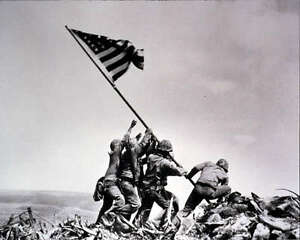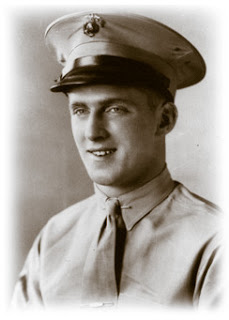Honoring America’s Heroes
Lorain, Ohio is a modest town, still struggling after major employers shut down. The American Ship Building Company, Ford Motor Company assembly plant, and the United States Steel Corporation’s steel mill left an economic void. The unemployment and poverty rates are higher than the national average. But a bright point in a city stigmatized for its Rust Belt depression is the Charles Berry Bridge along US Route 6. That bridge symbolically links a city situated 30 miles west of Cleveland, stretched out over 24 square miles to an eight-square-mile island in the Pacific Ocean 750 miles from Japan. The Charles Berry Bridge is named for Lorain’s native son: US Marine Corps Corporal Charles Joseph Berry who was posthumously awarded the Medal of Honor for his actions on March 3, 1945, on the island of Iwo Jima.*
February 19, 2023 marked the 78th anniversary of the beginning of the Battle of Iwo Jima. Strategically placed in the scheme of leap-frogging islands in the Pacific to encroach the coast of Japan for a possible invasion, the designated Operation Detachment was set in motion to capture the three airfields on the island. American intelligence was confident U.S. forces would take the island within a week of landing. There was heavy bombardment by Navy ships and U.S. Army Air Force aerial bombings to prepare the island for invasion; unbeknownst to our military, Japanese forces entrenched themselves in tunnels and had fortified machine gun and mortar positions across the island. In a battle that was supposed to last only a few days with minimal U.S. casualties, the island saw some of the bloodiest fighting of World War II. 70,000 Marines took part in the initial landing that culminated four days later as the American flag was hoisted atop Mount Suribachi on February 23. But the battle still raged on for five more weeks, ending on March 26, 1945. Over 6,800 United States Marines were killed. Of the estimated 21,000 Japanese, a little over 200 survived.

That is a snapshot of the statistical side of the war. It also produced the most iconic image from the Pacific Theater and captures the American ethos and the personification of patriotic spirit. The American flag rising above the savage fighting on the island below holds a meaning that rises above the image. It burns in the heart of every Marine. It describes the heroism, valor, bravery, selflessness, and courage of the men who fought in these battles — who faced an enemy they did not know in a land with which they were unfamiliar, miles away from the comforts of their homes and childhoods which could never prepare them for their wartime fate. During the battle, 27 Medals of Honor were awarded. Five were for Navy sailors, 22 for Marines. Iwo Jima Medal of Honor recipients made up over 25 percent of all those awarded to Marines in the entire Second World War — all for a barren volcanic island of only eight square miles.
“Where do we get such men?” President Ronald Reagan included this line in remarks he made at Hickam Air Force Base, Hawaii, in 1984; the quote is from the 1953 novel The Bridges at Toko-Ri by Pulitzer Prize-winning author James Michener. It was made into a film in 1954 starring William Holden and Grace Kelly. But the answer to the question isn’t found in the pages of a book or on the big screen, it is found in the sacred fields of Iwo Jima and every battlefield where courageous men breathed their final breath. We find such men like William Caddy in Quincy, Massachusetts. Darrell Cole was from Park Hills, Missouri. Ross Gray came from Marvel Valley, Alabama. Before 1st Lt. Jack Lummus sacrificed his life on Iwo Jima he played football with the New York Giants. He was born in Ellis County, Texas. Charles Berry was a truck driver.
We found such men in every corner of this great nation. They came from every walk of life, background, color, and class. We found them willing to throw their lives into the fire of war because they knew the cause for which they fought was worth it. These men grew up knowing the trials of their parents: The Great War and the Great Depression. There was no #Resistance; there were no “safe spaces.” There was only survival and persistence and determination. America was a place where patriotism wasn’t whispered, it was sung along the lines of “The Star-Spangled Banner” and “America the Beautiful.” It wasn’t shunned or something to be embarrassed about. The Pledge of Allegiance was the proper way to start a city council meeting and the school day.
Today it is different. Upcoming generations are continually reminded of the brokenness of America. In schools, history is presented with a heavy lean (even a bend at the waist) toward its failings. Administrators and bureaucrats promote a society of wokeness, in which there exists a hierarchy of victim classes and where oppression is a badge of honor. Politics is devoted to dividing this nation on the basis of fear of one another. Kids are brainwashed into believing America is corrupt at its core because it was founded by a group of racist bigots whose only intent was power and imperialism. We live in a backward world where pride and patriotism are shunned and apologizing for greatness is the required tithe.
When I go to the VA Medical Center here in Minneapolis, I see ever fewer WWII veterans and I mourn for the next generation who won’t bear witness to their stories and life lessons. And as the Greatest Generation fades, there are fewer Vietnam, Gulf War, and Global War on Terrorism veterans taking their place and sharing their stories. It is why sharing the stories of our heroes from the past is so important.
One of my most vivid memories from Marine Corps Officer Candidates School was of a day visit to the newly opened National Museum of the Marine Corps. It wasn’t just a welcome relief from the grueling training, but a time to gain a deeper understanding of the immense shadow we stood in as (hopeful) future leaders of Marines. We needed to understand the Corps’ history, traditions, and warrior ethos to be faithful in carrying out the missions ahead of us. I left that day in awe of the broad shoulders I stood upon, built up from generations of warriors who fought for a common cause. I returned a few weeks later as part of the first candidate class to be commissioned in the Museum, under the watchful eyes of our forebears. But the burden doesn’t just rest solely on the shoulders of the Soldier, Airman, Marine, or Coastguardsman who patrols the walls and shores, or storms the beaches. It lies in the vigilance of every American. We are the custodians of freedom. It is our duty to pass on the values that make this country worth the sacrifice of those who came before. Let us accept this solemn responsibility and boldly forge a path of liberty for all freedom-loving people.
The philosopher George Santayana is quoted as saying, “Those who cannot remember the past are condemned to repeat it.” I would argue that when don’t keep our past alive, we are condemned to not repeat it. If the next generation believes America is a nation bent on oppression and imperialism, greed, and bigotry, we won’t find men willing to fight for it. Men such as Charles Berry gave their lives so that their brothers could go home. They gave their lives for their children to grow up in a free country. They gave their lives so America could proceed with another generation safeguarded under the blanket of liberty and as a beacon to those around the world who seek the same. These men are national treasures. They embody the soul of heroism, valor, bravery, and selflessness. Thank God America has been blessed with such men, and I pray we never fall short of being worthy of such sacrifices, or raise the next generation who think America isn’t worth it. And I hope that everyone who passes over the Charles Berry Bridge in Lorain, Ohio knows the story behind the name, and the sacrifice it took to earn that honor.
*The Medal of Honor Citation for Corporal Charles J. Berry:

For conspicuous gallantry and intrepidity at the risk of his life above and beyond the call of duty as a member of a Machine-gun Crew, serving with the First Battalion, Twenty-Sixth Marines, Fifth Marine Division, in action enemy Japanese forces during the seizure of Iwo Jima in the Volcano Islands, on 3 March 1945. Stationed in the front lines, Corporal Berry manned his weapon with alert readiness as he maintained a constant vigil with other members of his gun crew during the hazardous night hours. When infiltrating Japanese soldiers launched a surprise attack shortly after midnight in an attempt to overrun his position, he engaged in a pitched hand grenade duel, returning the dangerous weapons with prompt and deadly accuracy until an enemy grenade landed in the foxhole. Determined to save the life of his comrades, he unhesitatingly chose to sacrifice himself and immediately dived on the deadly missile, absorbing the shattering violence of the exploding charge in his own body and protecting the others from serious injury. Stouthearted and indomitable, Corporal Berry fearlessly yielded his own life that his fellow Marines might carry on the relentless battle against a ruthless enemy and his superb valor and unfaltering devotion to duty in the face of certain death reflect the highest credit upon himself and upon the United States Naval Service. He gallantly gave his life for his country.
Specialist 4th Class Kenneth L. Olson was born in Willmar, Minnesota May 26, 1945. He died in the Republic of Vietnam, 13 May 1968 — days before his 23rd birthday. He is among a number of Medal of Honor recipients from Minnesota. His MOH citation:
For conspicuous gallantry and intrepidity in action at the risk of his life above and beyond the call of duty. Sp4c. Olson distinguished himself at the cost of his life while serving as a team leader with Company A. Sp4c. Olson was participating in a mission to reinforce a reconnaissance platoon which was heavily engaged with a well-entrenched Viet Cong force. When his platoon moved into the area of contact and had overrun the first line of enemy bunkers, Sp4c. Olson and a fellow soldier moved forward of the platoon to investigate another suspected line of bunkers. As the 2 men advanced they were pinned down by intense automatic weapons fire from an enemy position 10 meters to their front. With complete disregard for his safety, Sp4c. Olson exposed himself and hurled a hand grenade into the Viet Cong position. Failing to silence the hostile fire, he again exposed himself to the intense fire in preparation to assault the enemy position. As he prepared to hurl the grenade, he was wounded, causing him to drop the activated device within his own position. Realizing that it would explode immediately, Sp4c. Olson threw himself upon the grenade and pulled it in to his body to take the full force of the explosion. By this unselfish action Sp4c. Olson sacrificed his own life to save the lives of his fellow comrades-in-arms. His extraordinary heroism inspired his fellow soldiers to renew their efforts and totally defeat the enemy force. Sp4c. Olson’s profound courage and intrepidity were in keeping with the highest traditions of the military service and reflect great credit upon himself, his unit, and the U.S. Army.
American Experiment is grateful for the sacrifice of America’s fallen heroes and to the families they left behind.